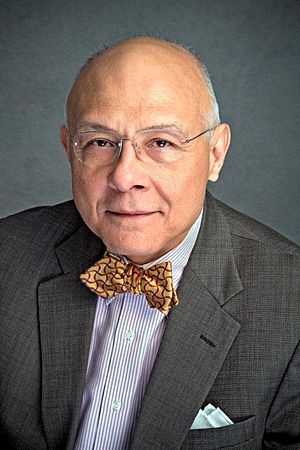M. William Howard Jr. facts for kids
Moses William Howard, Jr. (born March 3, 1946) is an American minister, former college president, and a leader in business and his community. He is known for working with different church groups in the United States and around the world. He has also been involved in world events, especially in the Middle East and Southern Africa.
Howard was born in Americus, Georgia. He grew up during a time of racial segregation, which meant that Black people and white people were kept separate by law. This experience shaped his views on fairness and justice. As a teenager in the 1960s, he helped Black citizens register to vote.
He went to Morehouse College and graduated in 1968. He then earned a master's degree from Princeton Theological Seminary in 1972. His teachers, like Professor Samuel Woodrow Williams, had a big impact on how he saw the world.
Contents
A Life of Leadership
After finishing his studies at Princeton, Howard began working for the Reformed Church in America (RCA) in 1972. He later became the president of New York Theological Seminary (NYTS) in 1992.
While at the RCA, he became involved with the World Council of Churches (WCC), a group of churches from all over the world that work together. He helped lead the WCC's program to fight racism. In 1978, at age 32, he was elected the youngest-ever president of the National Council of Churches in the USA.
Helping People Around the World
Howard was known for his bravery and his work to help others.
- Iran Hostage Crisis: In 1979, a group of Americans were being held hostage in Iran. At Christmas, Howard traveled there with two other church leaders, Bishop Thomas Gumbleton and Reverend William Sloane Coffin, to hold holiday services for the hostages.
- Syria Mission: In 1984, he went to Syria with the Reverend Jesse Jackson. They successfully negotiated the release of a captured U.S. Navy pilot, Robert O. Goodman.
Improving Education and Communities
As president of the New York Theological Seminary, Howard helped the school grow. He created partnerships with other schools and raised money to support its students and programs.
He was also a leader in his home state of New Jersey. He served on the Board of Governors for Rutgers University for ten years. In 2007, he led the New Jersey Death Penalty Study Commission. The work of this commission led to New Jersey becoming the first state in modern times to end the death penalty.
From 2000 to 2015, Howard was the pastor of Bethany Baptist Church in Newark. In 2020, he published a book called Black, Not Dutch, which tells the story of how the Reformed Church in America dealt with calls for reparations for African Americans.
Fighting for Freedom and Justice
For many years, Howard was a key figure in the fight against unfair rule in Southern Africa. He worked to end apartheid, a system of racial segregation in South Africa, and to bring freedom to countries like Zimbabwe and Namibia.
Because of his work against apartheid, the South African government would not allow him to enter the country from 1975 until 1990. This was the same year that the famous anti-apartheid leader Nelson Mandela was released from prison.
During this time, Howard led groups that put pressure on the apartheid government.
- He chaired the American Committee on Africa.
- He led a United Nations conference against apartheid in 1984.
- He stood with New Jersey Governor Thomas Kean in 1985 when the state sold its investments in companies that did business in South Africa. This was a way to protest apartheid.
Howard also led the first American church groups to visit Cuba and China after major political changes in those countries.
Personal Life
Howard married Barbara J. Wright in 1970. They have three adult children.
Jazz Aficionado
Howard is a big fan of jazz music. He is especially interested in how jazz connects to spirituals and blues music. When he was a pastor, he helped start a "Jazz Vespers" service at his church, where famous jazz musicians would perform as part of the worship.
Selected Awards
Howard has received many awards for his work, including:
- Toussaint L'Ouverture Freedom Award, 1980
- Distinguished Alumnus Award, Princeton Theological Seminary, 1982
- The Bennie Award for Achievement, from Morehouse College, 2008
- Named to the list of "Most Influential Corporate Directors" by Savoy Magazine, 2021
- He has also received several honorary degrees and keys to cities.
 | Shirley Ann Jackson |
 | Garett Morgan |
 | J. Ernest Wilkins Jr. |
 | Elijah McCoy |


